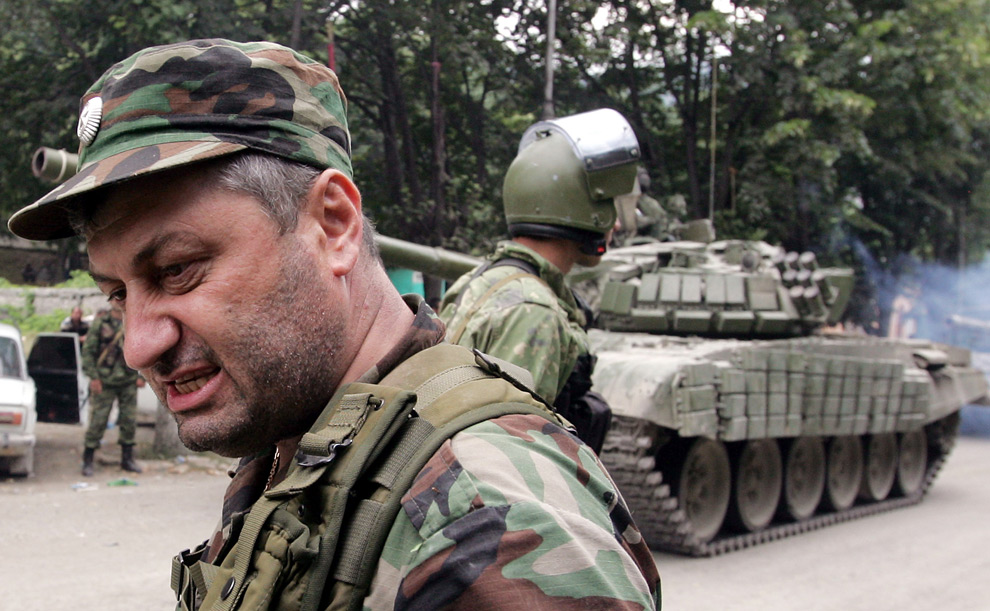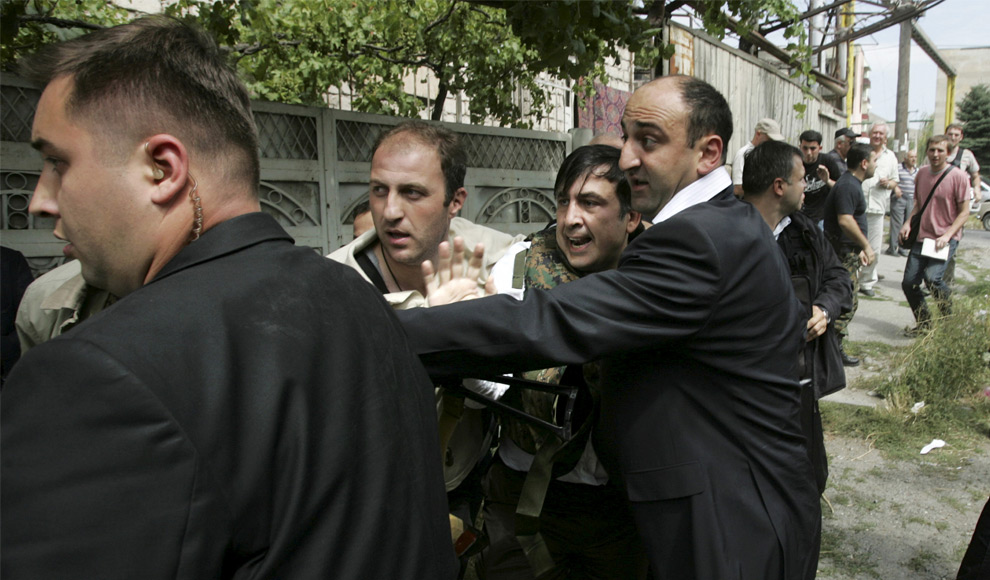by Tony Iltis, August 23
Since the European Union-brokered ceasefire brought the shooting war between Georgia and Russia to an end on August 12, there has been a war of words between Russia and the West.
One point of contention is the withdrawal of Russian troops from Georgia-proper (that is, Georgia excluding the de facto independent territories of Abkhazia and South Ossetia), in particular the towns of Gori, Zugdidi and Senaki and the port of Poti.
The war began with Georgia’s August 7 attack on the territory of South Ossetia. Russia responded with a military assault that first drove Georgian troops out of South Ossetia, then continued to advance within Georgia-proper.
Russia agreed to withdraw when it signed the ceasefire and has since indicated that it is doing so — but slowly, and not before systematically destroying Georgia’s military capacity.
A bigger difference, based on competing interpretations of what is and isn’t Georgian territory, is Russia’s stated intention to maintain a beefed-up peacekeeping presence in South Ossetia and Abkhazia.
Western leaders have stressed recognition of Georgia’s official borders, which includes the breakaway territories. US President George Bush stated on August 16 that “Georgia’s borders should command the same respect as every other nation’s. There’s no room for debate on this matter.”
Not Georgian
What this ignores is not only that most of South Ossetia and Abkhazia have been outside Georgia’s control since the early 1990s, but that the Abkhazians and Ossetians (who are both distinct non-Georgian nationalities) have shown in repeated referendums, as well as in the wars that followed the break-up of the Soviet Union in 1991, that they have no desire to be under Georgian rule.
While the Western media and politicians have portrayed the current war as Russian “great power” aggression against its much smaller neighbour, this ignores the fact that war was started by Georgia’s August 7 blitzkrieg that levelled South Ossetia’s capital Tskhinvali.
Anywhere between “dozens” and 1500 civilians were killed, depending on the source, and 30-40,000 refugees (half the population) fled across the border to North Ossetia-Alania, a republic within the Russian Federation.
Since coming to power with Western support in 2003, Georgian President Mikheil Saakashvilli has allied his country closely to the West.
However, since Georgia provoked the current war with Russia, it became clear that the West was not keen to get involved in a war with nuclear-armed Russia in support of its ally’s territorial ambitions.
Despite military assistance from the US and Israel, the Georgian army collapsed in disarray before the Russian advance. Russian and South Ossetian forces have been able to seize significant quantities of abandoned US and Israeli military hardware.
On August 21, there were thousands-strong protests in Tskhinvali and the Abkhazian capital Sukhumi demanding Russian recognition of independence of the territories.
The recognition of Kosova’s independence from Serbia (under Western supervision) has created a precedent in international law. Russia has refused to recognise Kosovan independence but has indicated that it could change this position in exchange for Western recognition of independence for Abkhazia and South Ossetia (under Russian supervision).
Nationalism
The conflicting nationalisms in the Caucasus is a result of the colonisation of the highly diverse region by the Russian empire, beginning in the 18th century.
This was followed by the promise of national liberation and equality between peoples by the 1917 Russian Revolution. This promise was betrayed when the revolution degenerated into bureaucratic dictatorship under Joseph Stalin.
National movements subsequently played an important role in the restoration of capitalism in the former Soviet Union in the 1990s.
Full control by the Russian empire of the Caucasus by 1864 was accompanied by ethnic cleansing of Muslims, which included about half the Abkhaz population.
After the 1917 revolution, the Bolsheviks recognised the rights of all peoples to self-determination. While the various nationalities of the North Caucasus (including Ossetians, Chechens, Ingushetians and the myriad of Dagestani ethnicities) formed the pro-Bolshevik Mountain Soviet Republic (MSR), Georgia, Armenia and Azerbaijan became anti-Bolshevik independent states propped up by British troops.
Between 1918 and 1921, what started as tax revolts by South Ossetians against the Georgian regime developed into full scale warfare, with the South Ossetians seeking to be united with their North Ossetian compatriots in the MSR, which from 1919 was an autonomous part of the Russian Soviet Federative Socialist Republic (RSFSR).
Georgian reprisals against the revolt took 18,000 lives. Keen to dislodge the British, the Red Army came to the aid of the Ossetians, the Abkhaz and a revolt by Georgian Bolsheviks. A Georgian Soviet Republic was established.
Similar processes established Soviet rule in Azerbaijan and Armenia.
Painfully aware of the resentment towards Russians in the nations colonised by the Tsarist empire, Bolshevik leader Vladimir Lenin stressed equality between nations.
In 1922, he clashed with Stalin, then commissar of nationalities, who despite being Georgian displayed, in Lenin’s words, “all the characteristics of a Great Russian bully” in his attempts to pressure the Georgian Bolsheviks into accepting absorption of their country into the RSFSR.
Stalin lost that fight and in 1922 Georgia, Abkhazia, Armenia and Azerbaijan became equal members of the Union of Soviet Socialist Republics.
North Ossetia became an autonomous republic within the RSFSR while South Ossetia became an autonomous district of Georgia.
Counter-revolution
However, following Lenin’s death in 1924, Stalin led a counter-revolution whereby a bureaucratic caste took power and undid many of the progressive gains of the revolution.
While national equality remained in form, its content was gutted. In 1931, Abkhazia was made an autonomous republic within Georgia and Georgian replaced Abkhaz as the official language.
The transmigration of Russians, Armenians and Georgians into Abkhazia was accelerated under Stalin. In the 1940s, having officially revived Russian nationalism in response to Nazi invasion, Stalin increased arbitrary acts of national oppression.
In the Caucasus this included deporting the entire Chechen and Ingushetian population to Central Asia.
Following Stalin’s death in 1953, the extremes of Stalin’s dictatorship were tempered, including the nationalities policy. Deported nationalities were allowed to return to their homelands and the suppression of Abkhaz culture ended.
However, while repression decreased, the main lines of bureaucratic dictatorship remained.
For Ossetians in the post-Stalin Soviet Union, the boundary between North Ossetia (part of the RSFSR) and South Ossetia (part of Georgia) became purely administrative, of no more significance than that between two Australian states.
On the one hand, in both territories the Ossetian language was used in government, education and the media. On the other hand, as with the rest of the USSR, in neither territory did people actually have a say in choosing their government, or the right to oppose it.
As the Soviet Union began to unravel in the 1980s, nationalism came to the fore as local bureaucratic elites sought to ensure their power in the post-Soviet order.
By 1988 war had broken out between Armenia and Azerbaijan, despite both being constituent republics of the USSR. The restoration of capitalism in the Soviet Union in 1991 was accompanied by its dissolution into constituent republics.
In Georgia, following unsuccessful attempts by Moscow to repress the nationalist tide, dissident and former political prisoner Zviad Gamsakhurdia was elected president in 1990.
While to Georgians, Gamsakhurdia’s slogan of “Georgia for the Georgians” and his appeals to historical mythology of ancient Georgian kings, represented freedom from Russia, to the Abkhaz and Ossetians it represented a threat to their national rights.
For the Ossetians, the dissolution of the USSR also meant the border between North and South Ossetia became an international frontier.
War and ‘autonomy’
In November 1989, South Ossetia voted to be merged with North Ossetia within the RSFSR, although this was vetoed by the Georgian Soviet government.
A march on Tskhinvali by Gamsakhurdia’s nationalists led to clashes and the intervention of Soviet troops. In 1990, South Ossetia tried to declare itself a constituent republic of the USSR.
Georgia, now under Gamsakhurdia’s presidency, responded by abolishing South Ossetia’s autonomy. By January 1991, before the USSR had dissolved, the dispute escalated into warfare between Georgian and Ossetian militias.
This war, which ended in 1992, cost hundreds of lives and created tens of thousands of refugees.
By this time Gamsakhurdia had been overthrown in a military coup and newly independent Georgia was degenerating into civil war. The peace agreement allowed for de facto independence and a peace keeping force involving Georgian, North and South Ossetian and Russian troops.
Gamsakhurdia’s successor, Eduard Shevardnadze, who had been the Stalinist head of Soviet Georgia in the 1970s, had reinvented himself as a democratic reformer and then again as a moderate nationalist when the military junta that overthrew Gamsakhurdia offered him the presidency.
While Shevardnadze ended the war in South Ossetia, he started another by invading Abkhazia, which had declared its independence to pre-empt abolition of its autonomous status.
This war ended in Georgian defeat, after the Abkhazians received help from a multi-ethnic North Caucasian volunteer force, the Confederation of Mountain Peoples of the Caucasus, who were accused of ethnic cleansing.
Hundreds of thousands of Georgians fled Abkhazia, leaving the Abkhaz as a demographic majority for the first time since the 19th century.
The 1993 peace agreement left it, like South Ossetia, legally part of Georgia but with a de facto independence guaranteed by Russia.
The US helped bring the ultra-nationalist Saakashvilli to power in 2003 with the aim of using him to pressure Russia.
However, Saakashvilli’s nationalist adventurism, backed by US and Israeli military aid, has resulted in handing Russia an opportunity to militarily crush Georgia and humiliate its Western allies.
In the brutal history of colonialism, competing nationalism, war and ethnic cleansing that has marked the Caucasus, the example of the early stages of the Russian Revolution stands out as offering a way forward.
The Bolshevik policy of granting national self-determination and seeking to ensure equality between peoples’, in contrast to the manipulation and violence used by various powerful interests that have dominated the region, is the only way of ensuring lasting peace.
From: International News, Green Left Weekly issue #764 27 August 2008.



